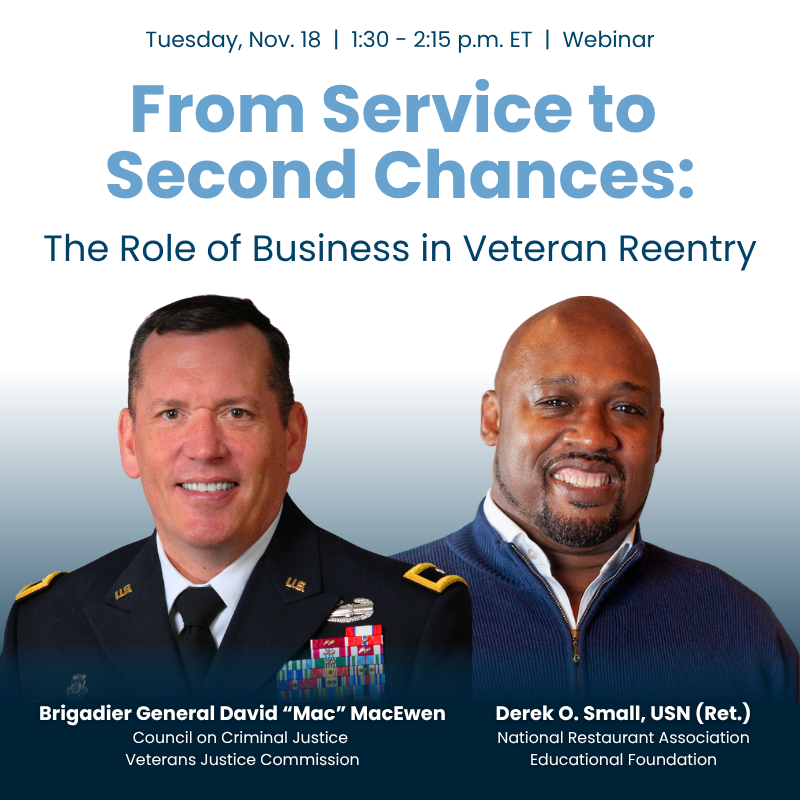Veterans with Records Deserve a Path Back to Work
Every Veterans Day, the U.S. honors those who’ve served and sacrificed for our country. Yet one group of former service members continues to be left behind: veterans who have had contact with the criminal justice system.
Without strong transition support after military service, too many U.S. veterans find themselves entangled in the justice system. Recent studies suggest that one in three of the country’s 19 million veterans reports having been arrested at least once in their lifetime, compared to one-fifth of the non-veteran population.
This scale of justice system involvement can create enormous roadblocks for veterans striving to rebuild their lives — and critically, their careers — after serving our country.
At the Responsible Business Initiative for Justice (RBIJ), we’re working to change that. With support made possible by a $1.5 million grant from Sam’s Club, RBIJ has launched efforts to help employers better understand the needs of justice-impacted veterans and to advance policies that make it easier for them to find stable, dignified employment. Learn more here about how your business can get involved.
Veterans face unique reentry challenges
Transitioning from military to civilian life can be difficult under the best of circumstances. Many veterans face challenges like post-traumatic stress, substance use, housing insecurity, and health issues after serving — all of which can increase the risk of justice system involvement. Employment is one of the most critical aspects to veterans’ successful transition back to civilian life, but once a criminal record is added to the equation, the barriers to finding stable, meaningful work grow steeper.
Some of these hurdles arise from outdated corporate hiring practices, including screening systems that automatically disqualify applicants with criminal records, regardless of the severity, relevance, or recency of their offenses. Others stem from poorly designed public policies, like those which block justice-impacted job seekers from obtaining occupational licenses, revoke driver’s licenses for minor, non–driving-related infractions, or make the expungement process so costly and burdensome that people can never truly move on.
What businesses can do
When companies embrace justice-impacted veterans, they gain access to a talent pool that often excels in the attributes employers value most: discipline, dependability, teamwork, and service orientation. Here are three ways that businesses can break down employment barriers for veterans with records.
1. Modify hiring practices.
Many job descriptions and screening systems unintentionally exclude justice-impacted candidates before they even reach an interview. Employers can start by reviewing automatic disqualifiers, revising unnecessary background check requirements, and training hiring managers to assess candidates' skills and potential, not just records. RBIJ is here to help — connect with our Inclusive Hiring team today for access to resources, training opportunities, and more.
“Being a second-chance employer has always been core to who we are at CONBODY. We’ve always focused on people’s potential rather than their past. The skills our justice-impacted veterans bring — their leadership, grit, and dedication — are exactly the kind of qualities we look for to keep our business thriving."
— Coss Marte, CEO of CONBODY
"My time in the military and my experiences with the justice system are both important parts of who I am, but they don’t define me. Having an opportunity at CONBODY — where those experiences are recognized as valuable skill builders, but only part of what I bring to the table — has made a real difference in how I see myself, my career, and my future."
— Derek Drescher, Fitness Instructor at CONBODY
2. Advocate for policy reforms.
Business leaders can use their influence — privately or publicly — to push for smart policy changes that strengthen career pathways for the justice-impacted veteran population. Advocating for solutions like expansions in access to occupational licenses, eliminations of unnecessary fines and fees in the justice system, and the automatic sealing of certain criminal records not only helps these veterans rebuild their lives, but unlock new pipelines of talent for employers. Learn more from our Policy & Advocacy team about advocacy opportunities in your state.
“As someone who understands the power of a second chance, I feel a deep connection to our justice-impacted veterans. They’ve already shown immense courage and commitment in serving this country. The least we can do is make sure policy and business practices — including Clean Slate laws that automatically seal old, irrelevant records — reflect that same belief in their potential and right to move forward.”
— Michelle Cirocco, Chief Impact Officer at Televerde and Executive Director at the Televerde Foundation
"I’m proud to work for a company like Televerde that not only welcomes veterans like me but actively champions policies that open doors for us. Here, I feel supported, respected, and truly seen."
— Coral Griswold, Client Engagement Manager at Televerde
3. Learn from leaders and peers.
Many employers have already seen the benefits of hiring justice-impacted veterans. RBIJ is committed to uplifting their learnings and insights through peer networks like the Workforce & Justice Alliance and educational events. Our next free webinar, “From Service to Second Chances: The Role of Business in Veteran Reentry,” will take place on Tuesday, Nov. 18 at 1:30 p.m. ET.
We hope you’ll join us to hear from Brigadier General David MacEwen (Director, Veterans Justice Commission, Council on Criminal Justice) and Derek O. Small, USN (Ret.) (Director of Military Programs, National Restaurant Association Educational Foundation) about practical strategies for recruiting, onboarding, and supporting justice-impacted veterans in the workforce. Register here.
Building a fairer future for those who’ve served
This Veterans Day, as we celebrate the courage and service of America’s military community, we must also recognize those who are too often forgotten — veterans who, despite justice involvement, remain deeply committed to rebuilding their lives and contributing to their communities.
By creating fairer hiring processes and public policies, business leaders can play a transformative role in helping veterans reclaim their futures, strengthening the companies, communities, and economy we all share.




